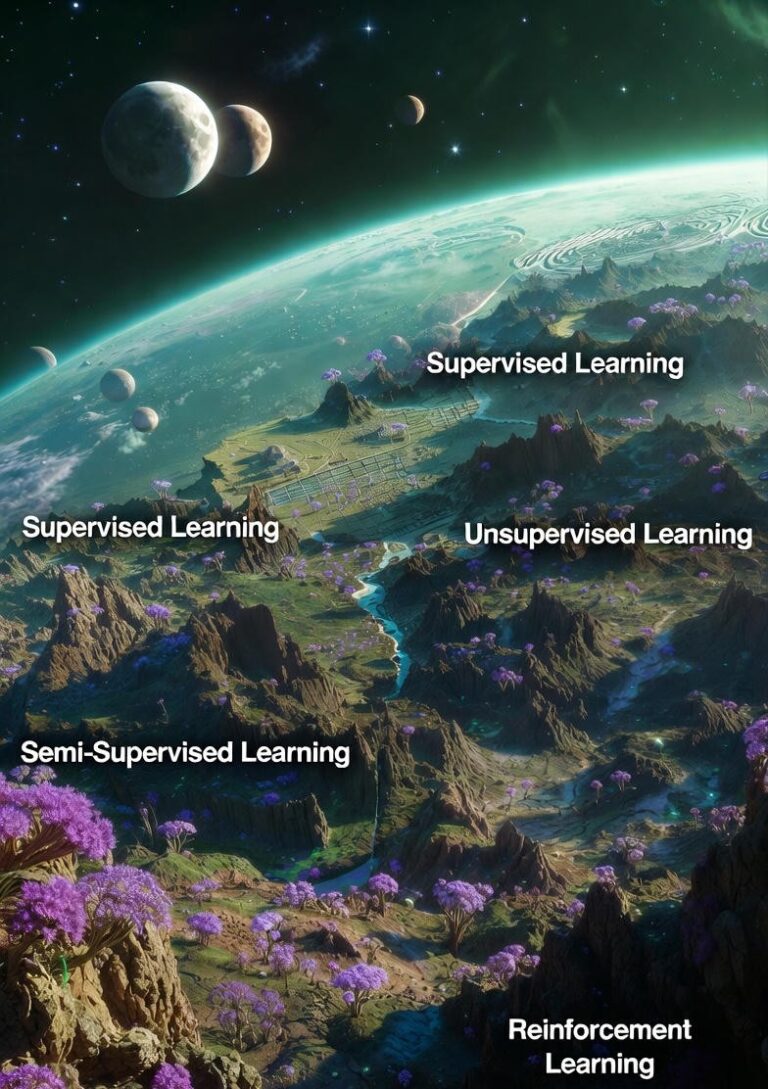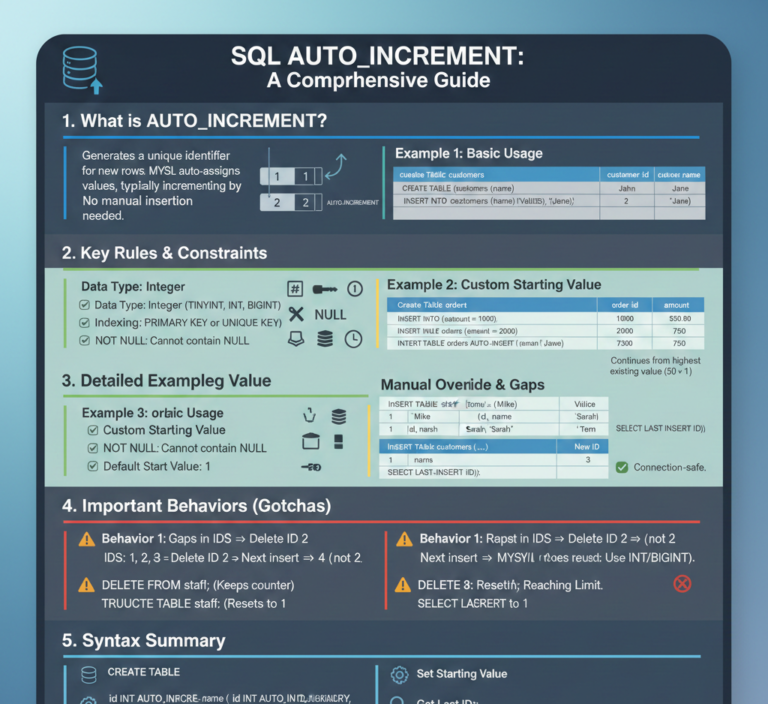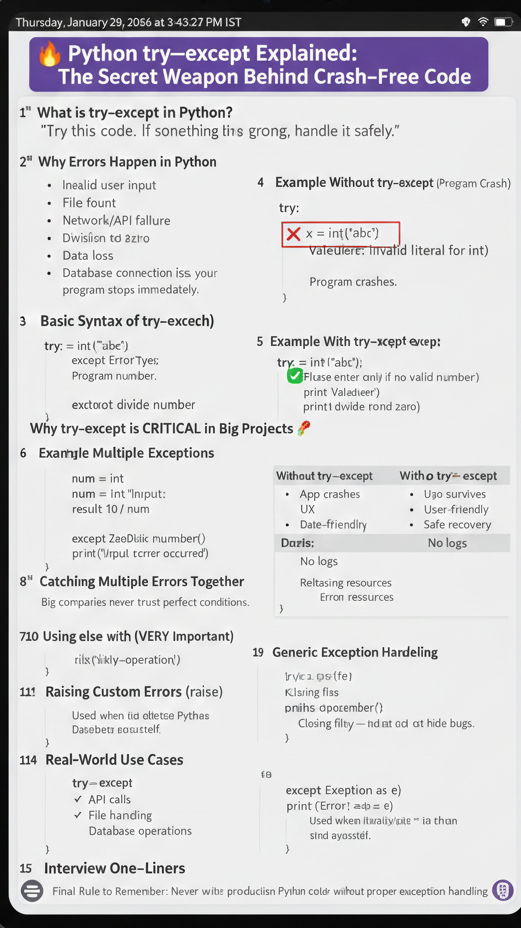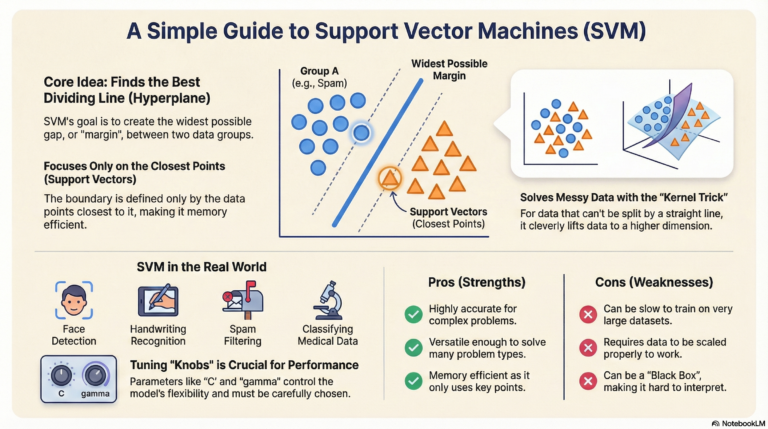What is MySQL?
MySQL is a popular open-source Relational Database Management System (RDBMS) that allows users to create, manage, and interact with databases. It is designed to efficiently store structured data and is based on the Structured Query Language (SQL), which is used to perform various operations on the data, such as inserting, updating, retrieving, and deleting records.
Key Features of MySQL:
- Open Source and Free to Use:
MySQL is developed under an open-source license, which means anyone can use, modify, and distribute it freely. - Relational Data Model:
It organizes data into tables, where each table consists of rows (records) and columns (fields), making data easy to manage and access. - High Performance and Scalability:
MySQL is known for its speed and ability to handle large volumes of data, making it suitable for both small applications and large-scale enterprise systems. - Cross-Platform Support:
It runs on various operating systems, including Windows, Linux, and macOS. - Strong Security Features:
MySQL includes robust security options such as user authentication, password encryption, and access privileges to protect data. - Community and Enterprise Editions:
The community edition is free and open-source, while the enterprise edition offers advanced features and technical support for commercial users.
Common Uses of MySQL:
- Web Development:
MySQL is widely used to power the backend of websites and web applications. It is often paired with languages like PHP, Python, and JavaScript. - Content Management Systems (CMS):
Platforms like WordPress, Joomla, and Drupal rely on MySQL to store content, user data, and settings. - E-commerce Platforms:
Online stores such as Magento and OpenCart use MySQL to manage product catalogs, customer information, and order histories. - Data-Driven Applications:
MySQL is a core component in many applications that require structured data storage and retrieval.
MySQL क्या है?
MySQL एक लोकप्रिय ओपन-सोर्स रिलेशनल डेटाबेस मैनेजमेंट सिस्टम (RDBMS) है, जो उपयोगकर्ताओं को डेटाबेस बनाने, प्रबंधित करने और इंटरैक्ट करने की सुविधा देता है। यह संरचित डेटा को कुशलतापूर्वक संग्रहीत करने के लिए डिज़ाइन किया गया है और SQL (Structured Query Language) पर आधारित है, जिसका उपयोग डेटा पर विभिन्न कार्यों जैसे कि जोड़ना, अपडेट करना, निकालना और हटाना करने के लिए किया जाता है।
MySQL की मुख्य विशेषताएँ:
1. ओपन-सोर्स और मुफ़्त:
MySQL एक ओपन-सोर्स लाइसेंस के तहत विकसित किया गया है, जिसका मतलब है कि कोई भी इसे निःशुल्क उपयोग, संशोधित और वितरित कर सकता है।
2. रिलेशनल डेटा मॉडल:
यह डेटा को टेबल्स में व्यवस्थित करता है, जहां हर टेबल में पंक्तियाँ (Rows) और स्तंभ (Columns) होते हैं, जिससे डेटा को प्रबंधित करना और एक्सेस करना आसान होता है।
3. तेज़ प्रदर्शन और स्केलेबिलिटी:
MySQL अपने तेज़ गति और बड़े डेटा को संभालने की क्षमता के लिए जाना जाता है, जिससे यह छोटे प्रोजेक्ट्स से लेकर बड़े एंटरप्राइज सिस्टम्स तक के लिए उपयुक्त बनता है।
4. मल्टी-प्लेटफॉर्म सपोर्ट:
यह Windows, Linux और macOS जैसे विभिन्न ऑपरेटिंग सिस्टम्स पर चलता है।
5. मजबूत सुरक्षा फीचर्स:
MySQL में उपयोगकर्ता प्रमाणीकरण (User Authentication), पासवर्ड एन्क्रिप्शन और एक्सेस कंट्रोल जैसी सुविधाएँ होती हैं जो डेटा को सुरक्षित रखती हैं।
6. कम्युनिटी और एंटरप्राइज एडिशन:
कम्युनिटी एडिशन पूरी तरह से फ्री और ओपन-सोर्स है, जबकि एंटरप्राइज एडिशन में एडवांस्ड फीचर्स और तकनीकी सहायता उपलब्ध होती है।
MySQL के सामान्य उपयोग:
1. वेब डेवलपमेंट:
MySQL वेबसाइटों और वेब एप्लिकेशन के बैकएंड को पावर देने के लिए बड़े पैमाने पर उपयोग किया जाता है। इसे अक्सर PHP, Python और JavaScript जैसी भाषाओं के साथ जोड़ा जाता है।
2. कंटेंट मैनेजमेंट सिस्टम (CMS):
WordPress, Joomla और Drupal जैसे प्लेटफॉर्म MySQL का उपयोग कंटेंट, यूजर डेटा और सेटिंग्स को स्टोर करने के लिए करते हैं।
3. ई-कॉमर्स प्लेटफॉर्म:
Magento और OpenCart जैसे ऑनलाइन स्टोर्स MySQL का उपयोग उत्पाद सूची, ग्राहक जानकारी और ऑर्डर हिस्ट्री को प्रबंधित करने के लिए करते हैं।
4. डेटा-ड्रिवन एप्लिकेशन:
MySQL का उपयोग उन सभी एप्लिकेशनों में किया जाता है जहाँ संरचित डेटा को संग्रहीत और एक्सेस करने की आवश्यकता होती है।







